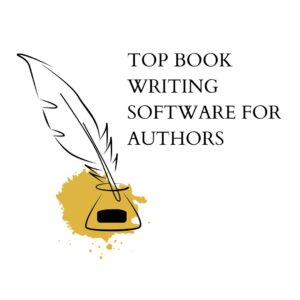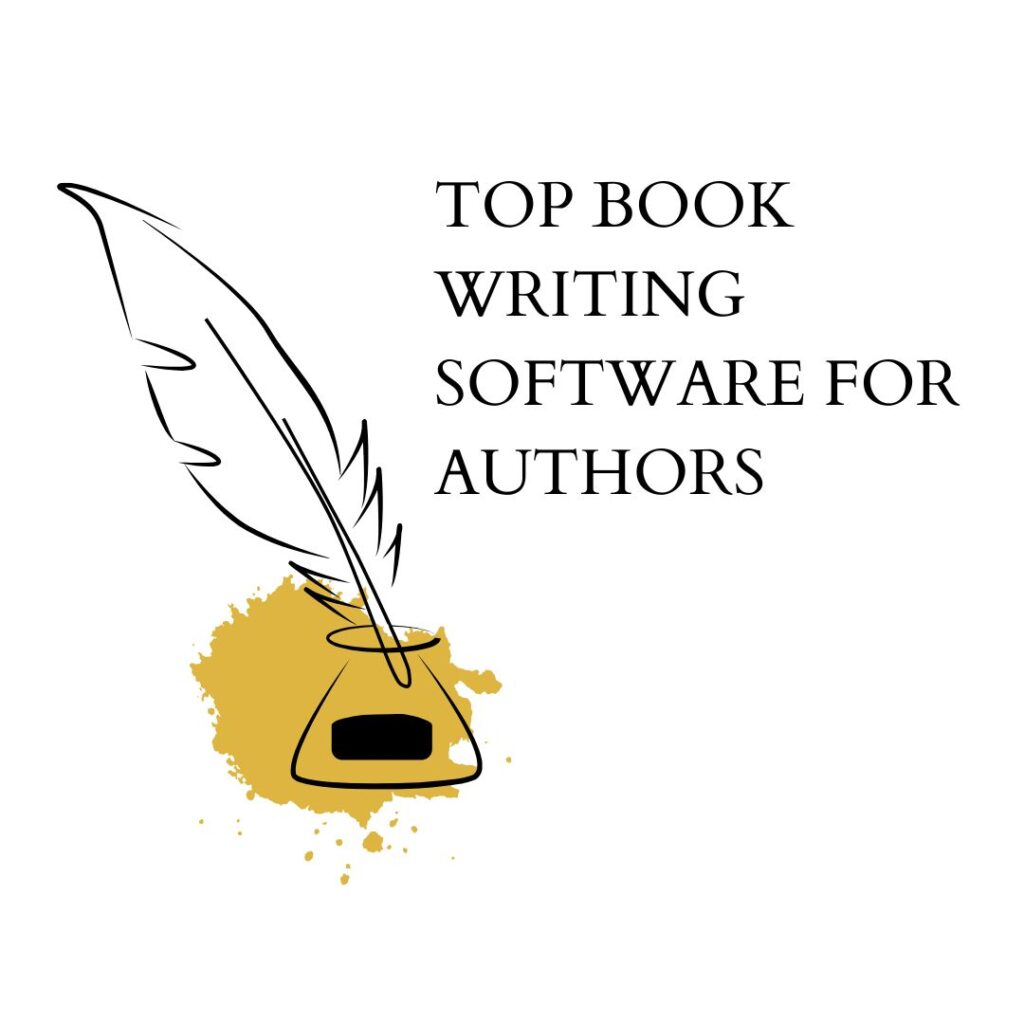Top Book Writing Software for Authors

Table of Contents
The Importance of Choosing the Right Writing Software
Selecting the right writing software can significantly impact your productivity and creativity as an author. The right tools can help you organize your thoughts, manage your manuscript, and streamline the editing process, making it easier to focus on what truly matters—writing your book.
Benefits of Using Specialized Writing Software:
- Enhanced Organization: Keep your notes, research, and drafts in one place.
- Goal Tracking: Set and monitor your writing goals to stay motivated.
- Formatting Assistance: Simplify the formatting process for publishing.
- Distraction-Free Environments: Create a focused writing space to boost productivity.
Key Features to Look for in Book Writing Software
When evaluating book writing software, consider the following features:
- User-Friendly Interface: A clean and intuitive design that makes navigation easy.
- Organizational Tools: Options for outlining, character development, and timeline management.
- Collaboration Features: Ability to share documents with beta readers or editors.
- Export Options: Support for various file formats (e.g., PDF, ePub) for publishing.
- Editing Tools: Built-in grammar checkers or integration with editing software.
Top Book Writing Software Options
1 Atticus
Atticus is an all-in-one book writing software that combines writing and formatting capabilities, making it ideal for self-publishing authors.
Key Features:
- Works on all platforms (Windows, Mac, Linux).
- Offers goal tracking and organization tools.
- Provides formatting options for print and eBook publishing.
Pricing: One-time fee of $147.Pros:
- Affordable compared to other options.
- Easy to use with a straightforward interface.
- Combines features of popular software like Scrivener and Vellum.
Cons:
- Some features may be limited at launch.
2 Scrivener
Scrivener is a powerful writing tool designed specifically for authors, providing extensive organizational features.
Key Features:
- “Binder” view for managing multiple documents.
- Corkboard and outliner modes for visual organization.
- Ability to set word count goals and track progress.
Pricing: $49 (with discounts available for students).Pros:
- Highly customizable with numerous templates.
- Excellent for long-form writing projects.
Cons:
- Steeper learning curve due to its extensive features.
3 Sudowrite
Sudowrite is an AI-powered writing assistant tailored for fiction authors, offering tools to enhance creativity.
Key Features:
- Story Engine for guided novel creation.
- Unique tools like “Show Don’t Tell” rewrites and plot twist generators.
Pricing: $19/month (225,000 credits) or $29/month (1,000,000 credits).Pros:
- Extensive feature set designed specifically for fiction writers.
- Great brainstorming tools that enhance creativity.
Cons:
- Can be overwhelming due to numerous features.
4 Dabble
Dabble is a cloud-based writing software that emphasizes simplicity and ease of use.
Key Features:
- Plotting tools that allow you to visualize your story structure.
- Automatic backup and syncing across devices.
Pricing: $10/month or $100/year.Pros:
- User-friendly interface suitable for beginners.
- Focuses on helping writers stay organized throughout the drafting process.
Cons:
- Limited formatting options compared to other software.
5 Google Docs
Google Docs is a free cloud-based word processor ideal for collaboration and editing.
Key Features:
- Real-time collaboration with editors or beta readers.
- Easy commenting and suggestion features.
Pricing: Free with a Google account.Pros:
- Accessible from any device with internet access.
- Excellent collaboration capabilities.
Cons:
- Lacks advanced organizational tools found in dedicated writing software.
6 Microsoft Word
Microsoft Word remains one of the most widely used word processors globally, offering robust editing features.
Key Features:
- Extensive formatting options suitable for various document types.
- Track Changes feature for collaborative editing.
Pricing: Subscription model starting at $69.99/year or one-time purchase options available.Pros:
- A familiar interface that many users are accustomed to.
- Powerful editing tools and templates are available.
Cons:
- Less focused on long-form writing organization compared to specialized software.
7 Ulysses
Overview: Ulysses is a minimalist writing app designed exclusively for Apple users, focusing on distraction-free writing.
Key Features:
- Markdown support for easy formatting.
- Organizational tools like folders and tags for managing projects.
Pricing: $5.99/month or $49.99/year.Pros:
- Clean interface that enhances focus while writing.
- Syncs across all Apple devices seamlessly.
Cons:
- Only available on Apple products; not suitable for Windows users.
8 Vellum
Overview: Vellum is primarily a formatting tool designed specifically for self-publishing authors looking to create professional-quality eBooks and print books.
Key Features:
- Beautiful templates that make formatting easy.
- Instant previews of how your book will look in various formats.
Pricing: One-time fee starting at $199 (for eBooks) or $249 (for eBooks & print).Pros:
- Produces high-quality formatted books quickly.
- User-friendly interface tailored for authors without technical skills.
Cons:
- Only available on Mac; not suitable for Windows users.
9 yWriter
Overview: yWriter is a free novel-writing software developed by author Simon Haynes that focuses on helping writers organize their projects effectively.
Key Features:
- Break your novel into chapters and scenes for easier management.
- Includes character profiles, location details, and more organizational tools.
Pricing: Free (donations accepted).Pros:
- Simple interface with powerful organizational features.
- Ideal for authors who prefer a straightforward approach without distractions.
Cons:
- Less visually appealing than other modern software options; and it may feel dated in design.
10 NovelPad
Overview: NovelPad is an online writing tool designed specifically for novelists that combines simplicity with powerful features tailored to long-form writing projects.
Key Features:
- Organize chapters easily with drag-and-drop functionality.
- Track word count goals and progress over time.
Pricing: Starts at $10/month after a free trial period.Pros:
- Clean interface focused solely on novel writing.
- Cloud-based access allows you to write from anywhere with internet access.
Cons:
- Limited formatting options compared to dedicated formatting software like Vellum or Atticus.
Comparison of Book Writing Software
| Software | Cost | Platform | Key Features |
|---|---|---|---|
| Atticus | $147 (one-time fee) | Windows, Mac, Linux | All-in-one tool; writing & formatting |
| Scrivener | $49 | Windows, Mac | Binder view; goal tracking; corkboard mode |
| Sudowrite | From $19/month | Web | AI-driven features; brainstorming tools |
| Dabble | From $10/month | Web | Cloud-based; plotting tools |
| Google Docs | Free | Web | Real-time collaboration |
| Microsoft Word | From $69.99/year | Windows, Mac | Extensive formatting options |
| Ulysses | From $5.99/month | Mac | Minimalist interface; Markdown support |
| Vellum | Starting at $199 | Mac | Professional formatting |
| yWriter | Free | Windows | Simple organization; character profiles |
| NovelPad | From $10/month | Web | Chapter organization; progress tracking |
Frequently Asked Questions (FAQs)
1. Why should I use writing software to write my book?
Using writing software can enhance your writing experience by providing tools for organization, formatting, and editing. These platforms often include features like outlining, goal tracking, and collaboration options that can help streamline the writing process and improve productivity.
2. What features should I look for in book writing software?
When choosing book writing software, consider the following features:
- User-Friendly Interface: A clean and intuitive design that makes navigation easy.
- Organizational Tools: Options for outlining, character development, and timeline management.
- Collaboration Features: Ability to share documents with beta readers or editors.
- Export Options: Support for various file formats (e.g., PDF, ePub) for publishing.
- Editing Tools: Built-in grammar checkers or integration with editing software.
3. Is there free writing software available for authors?
Yes, several free writing software options are available, such as:
- Google Docs: A cloud-based word processor ideal for collaboration.
- yWriter: A free tool focused on organizing novels by chapters and scenes.
- NovelPad: Offers a free trial with basic features for novel writing.
4. How does Scrivener differ from traditional word processors like Microsoft Word?
Scrivener is specifically designed for long-form writing projects and offers organizational tools like a binder view, corkboard, and outlining features. In contrast, traditional word processors like Microsoft Word focus primarily on document formatting and editing without the specialized tools for managing complex writing projects.
5. Can I collaborate with others using these writing software options?
Many writing software options offer collaboration features:
- Google Docs allows real-time editing and commenting.
- Dabble provides cloud-based access for shared projects.
- Scrivener allows you to export documents to share with others, though it doesn’t have built-in collaboration tools.
6. What is the best software for self-publishing authors?
For self-publishing authors, tools like Atticus and Vellum are excellent choices because they combine writing and formatting capabilities. Atticus is particularly versatile for both drafting and preparing manuscripts for publication, while Vellum specializes in creating professional-quality formatted books.
7. How do I choose the right writing software for my needs?
To choose the right writing software:
- Identify your specific needs (e.g., organization, collaboration, formatting).
- Consider your budget; some options are free while others require a subscription or one-time purchase.
- Try out a few different programs through free trials to see which interface you prefer.
8. Can I use multiple writing software programs simultaneously?
Yes! Many authors use multiple programs to take advantage of different features. For example, you might write your first draft in Google Docs for easy collaboration but switch to Scrivener or Atticus for organization and formatting during the revision process.
9. What if I encounter technical issues with my writing software?
If you encounter technical issues:
- Check the software’s official website or user forums for troubleshooting tips.
- Reach out to customer support if available; most reputable software companies offer assistance.
- Regularly back up your work to avoid losing progress due to technical problems.
10. How can I improve my writing skills while using these tools?
To improve your writing skills while using book writing software:
- Take advantage of built-in resources such as grammar checkers and style suggestions.
- Use outlining features to plan your story structure effectively.
- Engage with communities or forums related to the software where you can share experiences and receive feedback.
Conclusion
Choosing the right book writing software can significantly enhance your writing experience by providing the necessary tools to organize your thoughts, manage your manuscript effectively, and streamline the editing process. Whether you prefer an all-in-one solution like Atticus or specialized tools like Scrivener or Vellum, there are numerous options available to suit every author’s needs and preferences. By leveraging these powerful resources, you can focus more on what truly matters—writing your story—and less on the logistics of getting it onto the page or into print! Start exploring these options today and find the perfect fit for your writing journey! Happy writing!
Discover marketing services, interviews & publishing tools at SharingStories.



